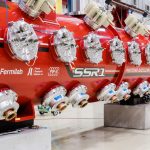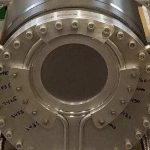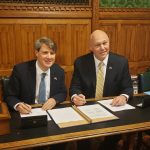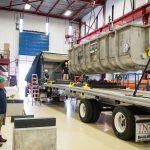PIP-II
Fermilab is currently upgrading its accelerator complex to produce the world’s most powerful beam of high-energy neutrinos. To generate these particles, the accelerators will send an intense beam of protons traveling near the speed of light through a maze of particle accelerator components before passing through metallic “windows” and colliding with a stationary target. Researchers are testing the endurance of windows made of a titanium alloy, exposing samples to high-intensity proton beams to see how well the material will perform.
From Cambridge Network, Feb. 3, 2020: Representatives from UK Research and Innovation and the US Department of Energy have signed an agreement that outlines £65 million worth of contributions that UK research institutions and scientists will make to the international Deep Underground Neutrino Experiment and related projects hosted by Fermilab. DUNE will study the properties of mysterious particles called neutrinos, which could help explain more about how the universe works and why matter exists at all.
Representatives from UK Research and Innovation and the U.S. Department of Energy signed an agreement that outlines £65 million worth of contributions that UK research institutions and scientists will make to the international Deep Underground Neutrino Experiment and related projects hosted by Fermilab.
From PBS Space Time, Jan. 6, 2020: Why is there something rather than nothing? The answer may be found in the weakest particle in the universe: the neutrino. In this 10-minute video, PBS Space Time host Matt O’Dowd and Fermilab scientist Don Lincoln explore the mysteries of the neutrino and how Fermilab is tackling them. The elusive neutrino may hold powerful secrets, from the unification of the forces of nature to the biggest question of all: Why is there something rather than nothing?
The first major superconducting section of the PIP-II accelerator has come to Fermilab: the first of 23 cryomodules for the future accelerator. The cryomodules’ job is to get the lab’s powerful proton beam up and moving, sending it to higher and higher energies, approaching the speed of light. This first cryomodule also represents a successful joint effort between Argonne National Laboratory and Fermilab to design and produce a critical accelerator component for the future heart of Fermilab.
From DOE’s Direct Current podcast, May 7, 2019: This episode of Direct Current takes a subatomic sojourn into the international Deep Underground Neutrino Experiment, hosted by Fermilab, a massive international research project aiming to unlock the secrets of the neutrino with help from more than 175 institutions in over 30 countries. Join Fermilab’s Chris Mossey, Bonnie Fleming and Lia Merminga and DUNE collaborator Christos Touramanis on a tour from Fermilab to CERN to the bottom of a former gold mine a mile beneath the hills of South Dakota.
From WDCB’s First Light, March 24, 2019: Brian O’Keefe interviews Fermilab PIP-II Project Director Lia Merminga about PIP-II, an accelerator project critical to the lab’s future. Fermilab broke ground on PIP-II on March 15. Learn about how PIP-II will power the international Deep Underground Neutrino Experiment, hosted by Fermilab, and the lab’s experimental program in this 15-minute piece.
From Gizmodo, March 20, 2019: The Proton Improvement Plan II, formally approved by the Department of Energy last summer, includes plans for the highest-energy linear particle accelerator to accelerate a continuous stream of protons — a central component to the American particle physics laboratory. Fermilab PIP-II Project Director Lia Merminga is quoted in this article.
From University of Chicago news, March 15, 2019: Fermilab officially broke ground March 15 on a major new particle accelerator project that will power cutting-edge physics experiments for many decades to come. The new 700-foot-long linear accelerator, part of the laboratory’s Proton Improvement Plan II, will be the first accelerator project built in the United States with significant contributions from international partners.




